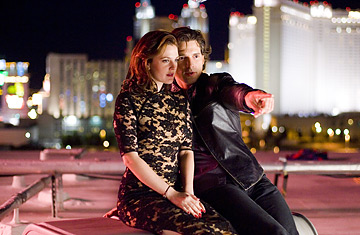
Huck Cheever, played by Eric Bana, and Billie Offer, played by Drew Barrymore, watch the Bellagio fountains from a neighboring rooftop in Lucky You.
And there ensues one of the best opening sequences I've seen in recent years. He wants to get more money for a digital camera than the store's owner (an obscure actress named Phyllis Somerville) wants to give him. He sets about reading and manipulating her mind. She knows what he's doing, gives as good as she gets and ends up adding fifty bucks to her price in return for the "entertainment." The scene is smart, funny, and as well acted as it is written.
Maybe the rest of Lucky You isn't quite as good as its beginning, but even so, it is more intricate and entertaining than recent experience has taught us to expect from big studio movies. It has a touch of romance, a touch of suspense and a touch of wildness as it recounts the misadventures of on Huck Cheever a professional poker player whose roiling, yet buttoned-down, emotions prevent him from being the big winner his talents entitle him to be.
Huck is played by Eric Bana, (Munich, Black Hawk Down) who is, I think, the most interesting young leading man around right now — capable of great intensity, shaded by elements of emotional confusion, without a lot of actorish egocentricity. He's one of those people who seems to totally live his roles and we like Huck despite the fact that he's drop-dead handsome, full of suppressed anger, self-destructive impulses and a tropism to very bad karma.
He needs to take lesson in cool from his daddy, L.C. Cheever (Robert Duvall), a poker champion and a master of icy self-control. But they have issues — something to do with the way the old man treated Huck's mother — and they are, eventually, head-to-head competitors in a very big Texas Hold 'Em game. Huck also has — you guessed it! — commitment problems. He meets a sweet-spirited woman named Billie Offer (Drew Barrymore), who's a poker innocent, but wise in the ways of fiddle-footed men whose obsessions do not necessarily include settling down with sensible women.
In a sense, the theme of director Curtis Hanson's movie, which he co-wrote with Eric Roth (Munich, The Good Shepherd) — a writer with a gift for patient, novelistic complexity — is the education of Huck Cheever. Even though that process proceeds via a certain amount of boy-girl, father-son clichés, the movie does not have a tired feeling about it. In part that's because Huck, who needs to get together enough money to pay his entrance fee for the World Championship of Poker and can only do so by "playing with the guppies" in small stakes games, is wildly inventive in losing his winnings the minute they accrue. It's not exactly fun to watch a guy keep self-destructing, but it gives the movie a curious kind of authenticity. Huck's mishaps have a nice unstructured feeling about them. Life just kind of keeps happening to him and his response, until the end, is always the same; he is, in poker-parlance, "a blaster" and blast he does — while we, watching, feel like crying out warnings to him.
Huck finally does make it into the World Series, where, at last, he commits what may be the first selfless act of his life, but before we get there, a lot of poker gets played and that's the movie's other great strength. Poker, obviously and uniquely, is a game of skill and luck — its drama consisting of talent mobilizing its strengths to minimize the workings of mischance. Wisely, I think Hanson (also the director of LA Confidential and 8 Mile) focuses on the game, which is the thing to which all his characters, except Billie, have utterly surrendered themselves. It defines these people and his direction of the game sequences is clear, suspenseful and witty. Alfred Hitchcock used to say that you could make a movie in a telephone booth if you were skillful enough, and a poker table is not much bigger. To concentrate on it as intensely as Hanson does, without becoming flashy or self-conscious (and without investing anyone but his leads with a lot of distracting back stories) requires discipline and trust in his material.
There is, however, a mystery about Lucky You. Warner Bros. is tossing it out on the weekend Spider-Man 3 is expected to earn a gajillion dollars. In effect, they're saying, if you can't get a ticket for Spidey, maybe you'll wander down the multiplex hallway and take a look at our picture. It is also said that Hanson has been forced into many months of re-editing fuss to reach this frustrating point. Finally, it has been observed that televised poker, which became a TV darling when this picture was green-lit, has lost some of its audience appeal. Maybe all that is true, but I suspect the problem is that Hanson's film simply holds zero interest for the only reliable mass audience the movies retain — young males and their dates.
This is not exactly new news. Which makes you wonder why they decided to do the film in the first place. But Hollywood has never been an entirely rational place, and Lucky You is not in any sense a great movie, a masterpiece that future generations will want to rediscover. But it is a solid, well-made, generally gripping and intelligent movie — and how many of those have lately been made in America? So don't worry if you're shut out of Spider-Man. There is an alternative — and one that will afford you the kind of agreeable pleasure that genre movies once routinely supplied and now only rarely do.
